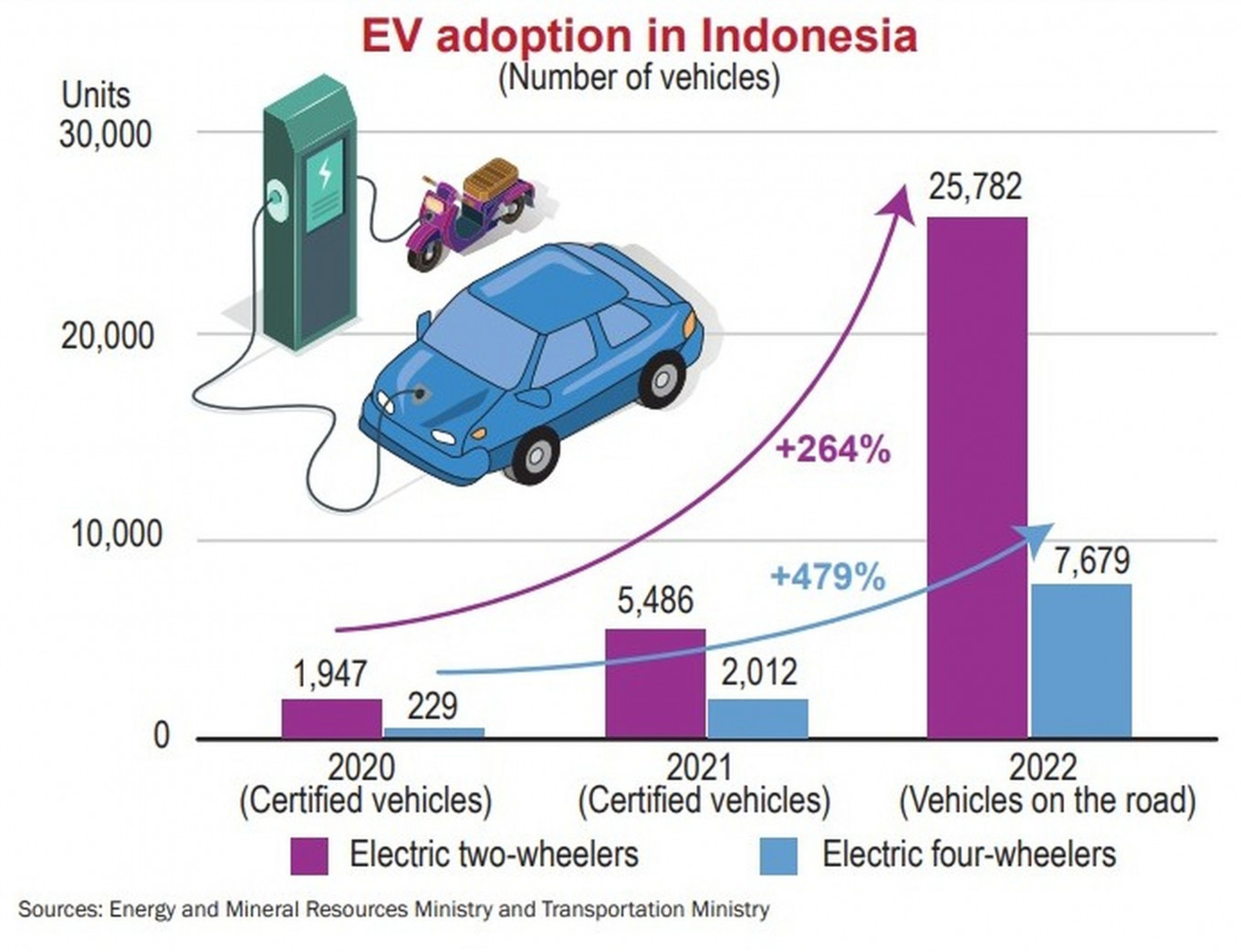Popular Reads
Top Results
Can't find what you're looking for?
View all search resultsPopular Reads
Top Results
Can't find what you're looking for?
View all search resultsOnly fraction of motorbikes in Indonesia to be EVs by 2030
Electric motorcycle sales almost tripled from 2021 to 2022, but even with the significant improvement, only a fraction of Indonesia's conventional motorcycles could be replaced by electric ones over the coming years, analysts say.
Change text size
Gift Premium Articles
to Anyone
E
lectric motorcycle sales almost tripled from 2021 to 2022, but even with this significant improvement, only a fraction of Indonesia's conventional motorcycles could be replaced by electric ones over the coming years, analysts say.
One of the world’s largest motorcycle markets, Indonesia is focusing on the more than 115 million motorcycles roaming the country’s roads as it presses ahead with efforts to electrify transportation.
Southeast Asia’s largest economy is expected to see annual motorcycle sales rise from a little over 5 million last year to 6.4 million by 2030, 1.9 million of which could be electric ones, according to a report by global management consulting firm McKinsey & Company.
However, the high upfront costs and limited driving range of electric motorbikes, among other things, remain barriers to realizing this potential.
Putra Adhiguna, an energy analyst at the Institute of Energy Economics and Financial Analysis (IEEFA), said electric motorcycle sales had risen 191 percent from around 12,000 units in 2021 to 35,000 last year.
Yet Indonesia would need a continuous annual growth rate of 60 to 70 percent each year until 2030 to get to 1.9 million electric motorcycle sales, he explained.
“This year and next year would be a testing period for the growth of Indonesia’s electric motorcycle adoption rate,” he told The Jakarta Post on Wednesday, declining to provide a numerical estimate because of the “dynamic situation” in the market.
The government has vowed to turn Indonesia into a global hub for electric vehicle (EV) manufacturing and exports. The country has stepped up its efforts to attract investment in the EV supply chain from mineral processing and battery manufacturing to vehicle assembly, with plans to introduce incentives for EV purchases being the latest initiative.
Regarding the EV purchase incentives, Putra suggested the government and stakeholders involved in the development of the policy ensure that the regulation would not induce profiteering without any effort to improve the long-term market sustainability.
“What will the government do if the people still cannot afford electric motorcycles after the incentives are put in place, or if the local content requirements are not met? Incentives should also promote other aspects, such as driving range or battery charging stations, to better address users' key concerns,” he said.
Indonesia is facing challenges in pushing EV adoption amid consumer concerns about technology and pricing.
Read also: Indonesia to introduce EV purchase incentives in March
When it comes to cities, for example, people tend to keep moving back and forth, and the distance can add up to around 100 kilometers a day, making them insecure about charging infrastructure and battery charging time, Azis Armand, vice president director of Indika Energy, a leading energy firm with two EV arms, said in an interview with the Post on Feb. 15.
Given that electric motorcycles currently available in Indonesia only have a riding range between 60 and 100 km at most, consumers may conclude that EVs would not support their daily commute requirements.
This mindset puts the industry in a complex chicken-and-egg situation, where providers of charging infrastructure are waiting for greater demand in the market as more EVs hit the road, while potential EV buyers wait for the charging infrastructure to be well developed.
“From the business perspective, we need demand to be there first. But of course, eventually, Indonesia also needs to have a complete EV ecosystem when domestic demand starts to ramp up in the future. So we’re right on track,” Azis said.
A report from consultancy firm IBM Institute for Business Value (IBV) found that only 13 percent of surveyed auto industry executives worldwide anticipated that their countries would be ready to support large EV fleets by 2030.
Not until 2040 did 89 percent of respondents anticipate their countries will be ready to support an EV fleet. That finding does not align well with the projection that EVs will account for 40 percent of global vehicle sales in 2030, the same report reads.
Published in February, the report is based on executive interviews and online surveys on EVs in major automotive markets focusing on fully electric vehicles. It included the responses of 1,501 executives from nine countries.
Read also: Consumers’ concerns hamper electric vehicle adoption in Indonesia: Experts
“Incentives should be in place until the electric motorcycle industry in Indonesia matures,” Tenggono Chuandra Phoa, secretary-general of the Indonesian Electric Vehicle Industry Association (Periklindo), said in a text message.
Legacy automakers absence
Another challenge Indonesia faces in its attempt to realize its electric motorcycle potential by 2030 is the “complete absence” of legacy automakers in the electric motorcycle industry, according to an IEEFA report published in February.
Giant motorcycle manufacturers Honda and Yamaha dominate Indonesia’s motorcycle market, but their record on EVs is nowhere near the scale of their commercial strength.
“[What can be done] for the new entrants to grow and displace these two companies, which hold [a combined] 96 percent of the [Indonesian] motorcycle market, is a question that must be openly addressed,” IEEFA’s Putra wrote in the report.
The Indonesian Motorcycle Industry Association (AISI) reported that Indonesia had 43 electric motorcycle brands, of which three non-legacy players accounted for nearly 75 percent of the entire market: Viar, Gesits and Volta, all of which are Indonesian manufacturers.










